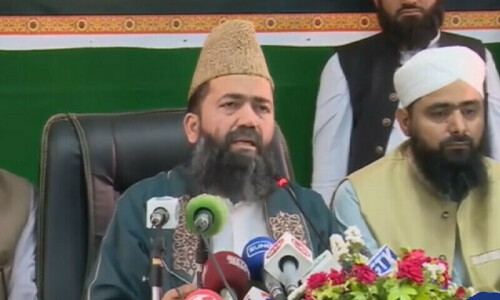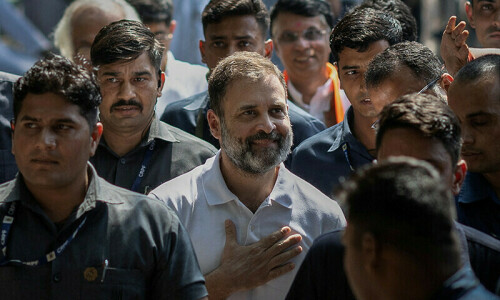TOKYO: Hiroshima on Friday marked the 76th anniversary of the world’s first atomic bombing, as the mayor of the Japanese city urged global leaders to unite to eliminate nuclear weapons just as they are united against the coronavirus.
Mayor Kazumi Matsui urged world leaders to commit to nuclear disarmament as seriously as they tackle a pandemic that the international community recognises as threat to humanity.
Nuclear weapons, developed to win wars, are a threat of total annihilation that we can certainly end, if all nations work together, Matsui said.
The United States dropped the world’s first atomic bomb on Hiroshima on Aug. 6, 1945, destroying the city and killing 140,000 people. It dropped a second bomb three days later on Nagasaki, killing another 70,000. Japan surrendered on Aug. 15, ending World War II and Japan’s nearly half-century of aggression in Asia.
Countries stockpiled nuclear weapons during the Cold War and a standoff continues to this day.
Matsui renewed his demand that Japan’s government immediately sign and ratify the Treaty on the Prohibition of Nuclear Weapons.
Prime Minister Yoshihide Suga did not mention the treaty in his speech at the Hiroshima Peace Park ceremony, where aging survivors, officials and some dignitaries observed a minute of silence for the 8:15 a.m. blast. At a news conference later, Suga said he has no intention of signing the treaty.
The treaty lacks support not only from the nuclear weapons states including the United States but also from many countries that do not possess nuclear arms, Suga said. What’s appropriate is to seek a passage to realistically promote nuclear disarmament.
The Treaty on the Prohibition of Nuclear Weapons took effect in January after years of civil effort joined by atomic bombing survivors, or hibakusha. But while more than 50 countries have ratified it, the treaty notably lacks the U.S. and other nuclear powers as well as Japan, which has relied on the U.S. nuclear umbrella for its defense since the wars end.
After the ceremony, Suga apologised for inadvertently skipping parts of his speech. The sections that were dropped included a pledge to pursue efforts toward achieving a nuclear-free world as head of the world’s only country to have suffered atomic attacks, according to his speech posted on the Prime Minister’s Office website.
Some said Suga skipping those parts of his speech spotlighted what could be seen as government hypocrisy over nuclear disarmament and the treatment of atomic bomb survivors.
The important point is that his heart simply wasn’t there, former Hiroshima Mayor Tadatoshi Akiba said on an online news conference later Friday.
Akiba has proposed a moment of silence by Olympic athletes and participants to mark the Hiroshima and Nagasaki atomic bombings, urging the International Olympic Committee to take action and not just talk about world peace.
Although a moment of silence didn’t occur at the Olympics on Friday, there will be a moment of remembrance at Sunday’s closing ceremony for all lives lost, including those in Hiroshima, organizing committee spokesman Masa Takaya said.
Many survivors of the bombings have lasting injuries and illnesses resulting from the explosions and radiation exposure and face discrimination in Japanese society.
The government began to provide medical support to certified survivors in 1968 after more than 20 years of effort by them.
Published in Dawn, August 7th, 2021











































